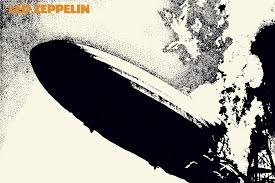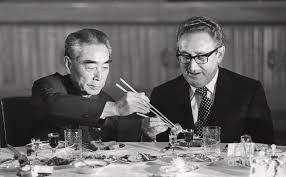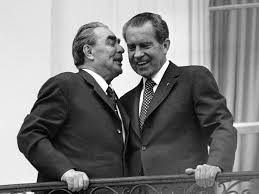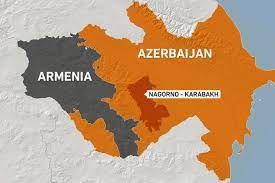Over at Responsible Statecraft there is a symposium on the Ukraine’s Kursk Incursion and what it means down the road. I read all the entries and there is a general consensus that in the long run the incursion is more likely than not a strategic mistake. And then every single one of the commenters (except one) adds their “but” to the conversation. Obviosuly, I tend to see the world as John Mearsheimer does, but found the symposium a useful tool to gauge the thoughts of International Relations scholars across the spectrum. As I said, there is a general consensus. Give it a read, it’ll only cost you 15 minutes, tops.
Month: August 2024 Page 3 of 4
A UK-Chinese collaboration has sequenced the DNA of all the 827 kinds of wheat, assembled by Watkins, that have been nurtured at the John Innes Centre near Norwich for most of the past century.
In doing so, scientists have created a genetic goldmine by pinpointing previously unknown genes that are now being used to create hardy varieties with improved yields that could help feed Earth’s swelling population.
Strains are now being developed that include wheat which is able to grow in salty soil, while researchers at Punjab Agricultural University are working to improve disease resistance from seeds that they received from the John Innes Centre. Other strains include those that would reduce the need for nitrogen fertilisers, the manufacture of which is a major source of carbon emissions.
“Essentially we have uncovered a goldmine,” said Simon Griffiths, a geneticist at the John Innes Centre and one of the project’s leaders.
“This is going to make an enormous difference to our ability to feed the world as it gets hotter and agriculture comes under increasing climatic strain.”
If some obsessive, one individual, hadn’t collected these seeds, then an institution had kept them safe, we’d be a lot more likely to starve in the future.
The most bio-diverse land ecosystem are rainforests, and we’re cutting them down, destroying entire ecosystems. Destroying ecosystems is like burning your house to save on heating bills. Leaving aside all the climate change issues, and that collapsing ecosystems may lead to collapse of life support for humans, each animal, plant, microbe or insect we make extinct has the potential to have genes which could lead to scientific advances: not just in food crops but in medicine and if we don’t have civilization collapse, for gene therapies and enhancements of incalculable value to humanity.
Increased longevity, faster healing, improved immune systems, greater heat or cold tolerance and far, far more could be lost because of this short sightedness.
It took hundreds of millions of years to create such a diverse web of life, and on the human scale, once it’s gone, it’s gone and we aren’t getting it back.
We should either stop (we aren’t going to) or at the least preserve samples of everything we can, in vaults designed to run for at least centuries with minimal human support and without requiring more than simple maintenance. If we’re young enough, the lives we save might be our own, if not our grandchildren and later descendants will thank us, and, just perhaps, we might may be able to bring back to life some of the species we are currently genociding.
This is the second in a series of essays on Russia, war, grand strategy and history.
Diplomacy is the politics of anarchy.¹ Grand strategy usually manifests itself through diplomacy, but in failure, as Clausewitz instructs us, war. I wave this semaphore to avoid confusion by opening a discussion on Russian grand strategy with an overview of diplomatic history. No longer a superpower, the United States is now a great power primus inter pares. The US, no longer able to dictate the politics of anarchy must learn to appreciate the rising risk of general warfare among great powers. Such a conflict is now probable before my generation shuffles off our collective mortal coil. Maybe next year, maybe in twenty. But facts are stubborn and China has superseded the United States in all but two or three of the most important measures of economic and military power.
We live in a revolutionary diplomatic moment. First, the eminent collapse of the global diplomatic order created by Kissinger and Zhou En-lai with the Shanghai Communiqué in 1972 is, if not already dead, dying. America’s perplexing abandonment of the triangular diplomacy§ that kept the then Soviet Union and its successor state the Russian Federation and China closer to the US than to each other, has further eroded the global balance of power out of America’s favor. The American grand strategy of the 20th century—prevent any single power or coalition of hostile powers from dominating the Eurasian landmass—has been surrendered to a 21st century foreign policy of cobbled together, ill-thought out and impulsive moves, engineered by small-minded think tank ideologues and the little men of domestic politics hoping to ‘make America great again.’ I doubt three out of hundred Americans understand how seriously we torpedoed our own power by abandoning a successful grand strategy in favor of limited ideals like the “dual containment” of rogue states or the policy to fight “two and a half wars” simultaneously as Madeleine Albright’s “indispensable nation” during the Unipolar Moment of the 1990s. But, denial is not a river in Egypt and so Thucydides’ trap∇ patiently awaits an irresponsible United States like a Praying Mantis.
Great power wars within the Westphalian system run in hundred year cycles.∅ The end of the Thirty-Years War in 1648 inaugurated the Westphalian world. Roughly a hundred years later the War of Austrian Succession begat the Seven-Years War, the first truly global war. The Treaties of Paris and Hubertusburg were signed in 1763, but left open more questions than the wars resolved.
Open diplomatic questions have a nasty tendency to war. Such were the misunderstood results of the 1763 peace, like the American struggle for Independence, arising out of England’s near bankruptcy. A reinvigorated French naval challenge to England and the domestic forces unleashed by French support of American independence attenuated the natural hundred-year gap between Great Power wars. These unintended consequences lit the French Revolutionary fuse that erupted in 1789 and ended in 1815. A renewed hundred-year gap ended with the Miracle on the Marne in September 1914. This Second Thirty-Years War, fought to settle Germany’s place in Mitteleuropa, ending in 1945 is a complete historical epoch. Taking the end of WWII in 1945 and subtracting the present year 2024 gives us an interval of 21 years in which the global balance of power continues to shift out of America’s favor and into China’s.
The balance of power is not some recondite or esoteric construct. It is a crucial gauge of power relations in an anarchic system. But it is a lagging indicator. Indeed, when the balance of power is re-established after wars or significant diplomatic denouements (e.g. the reordering of the European alliance system after the Diplomatic Revolution of 1756 or the combined effects of the Nixon-shocks that unraveled the post-WWII financial settlement of Bretton Woods in August 1971 and the subsequent rearrangement of the global order with the Shanghai Communiqué in February 1972) the results simply confirm what existed beforehand. The démarche or war confirms pre-existing facts on the ground, not as most believe, create new ones. Need I remind anyone of Dick Cheney’s Baudrillard-like post-modern comment on the Iraq war when he said, “we make the reality.” No, Dick, actually you do not. We lost in Iraq. But poor Dick’s limited horizons could not conceive that the politics of war are older than humanity itself. Our closest primate relatives, chimpanzees—not bonobos— play at politics identically. “[Primatologists have] concluded that rather than changing the social relationships, [chimpanzee] fights [and wars] tended to reflect changes that had already taken place,” remarks Lawrence Freedman in his book Strategy.”† A brilliant, if depressing, observation on the human condition.
Russian grand-strategy under Putin’s twenty-five year tenure has been quadripartite in nature. First, quash any and all separatist movements or insurgencies within the internationally recognized borders of the Russian Federation—to prevent a Soviet style dissolution of the entirety of Eurasia. Second, place all of Russia’s vast resources under the umbrella of state control. Third, subject to the completion of aim number two, Russia sought neocolonial controlling stakes over the vast majority of resources within the previous borders of the USSR—know as the Near Abroad. Putin’s fourth aim is to secure a non-NATO buffer zone, or sphere of influence, to the south and west large enough to keep Russia safe from invasion from those two cardinal points.
Of course, nuclear weapons do form a part of Russian grand strategy but they are a separate problem understood best within the context of the late 20th century arms control regime created by Nixon and Brezhnev, affirmed by Reagan and Gorbachev, and enlarged by Bush the Elder and Clinton with Yeltsin. For now, prudence dictates we proceed under the precondition that any war Russia fights will be conventional, that is until its existential interests have been breached. Adjacent threats are not direct, but there can be no denying (not-so) covert NATO, sorry, I mean Ukrainian attacks against Russian ballistic missile early warning radars are provocative in extremis. The Ukraine is not a nuclear power and without need or interest in destroying such radars. It’s NATO action.
Full stop.
Shrewd Putin shows more restraint than any contemporary Western leader possesses.² Just look at Macron flailing wildly about France fighting Russia—its historical ally! Or Polish President Andrzej Duda agitating direct NATO war against Russia. Sure, its lunacy but rational lunacy in a Polish context. But, with every new report of NATO, so sorry, I mean Ukrainian, skullduggery my sphincter tightens and I look to build a bomb shelter.
On 9 August 1999 Russian President Boris Yeltsin named then unknown Vladimir Putin as his prime minister. In September a series of apartment bombings, attributed to Chechen separatists, in Moscow and Volgodonsk killed over 300 people.‡ Most observers, including myself, believe this was a false-flag operation. Whatever the case, it succeeded in galvanizing the Russian people in advance of the Second Chechen War. Putin quickly eclipsed Yeltsin as president of the Russian Federation on December 31, 1999 and subsequently ordered the bombing of Grozny. Putin pursued the Second Chechen War with ruthlessness right up to its official non-official ending in 2009. For ten years Russia showed no mercy, raining destruction and death on Chechen town and village, combatant and civilian alike.
Why? Because the consequences of failure were so grim, not just for the Russian Federation, but for the world. Herein lies a significant failure of American imagination. Try and visualize the chaos of a rump Russian state ending at the Ob River and a dozen more sovereignties existing across Eurasia. The resulting power vacuum and disruption to the balance of power would have made the Balkans look like a Sunday picnic. Make no mistake, this is the terminal goal of former Undersecretary of State for Revolution and Chaos, Victoria Nuland, wife of neocon éminence grise Robert Kagan, should the Ukraine prevail. It’s insanity equivalent to opening a can of baby sand-worms from Arrakis in the Gobi Desert just to see what happens. Neocons, like Nuland, suffer from what I call khaophilia, from the ancient Greek meaning love of chaos. They are rubberneckers on the interstate whose stupidity cause mass pileups. Or as my Turkish buddy Murat said one gorgeous spring day of a young ne’er do well on the streets of İstanbul, “he has an uncontrollable desire to throw rocks at hornet’s nests and watch what happens.” Think Libya. But I digress.
The second arc of Putin’s grand strategy was complete within four years of his accession and election to the Russian presidency. By 2003 he had dissolved every independent media outlet and stripped all but the most dangerous of oligarchs of their power and assets, exiling many. He reserved the most severe punishment for his most serious and worthy opponent, Mikhail Khodorkosky. At the time Khodorkovsky was worth an estimated $15 billion USD and was CEO of Yukos, Russia’s largest oil and gas company. Putin had his assets seized by and incorporated into the state oil company Rosneft. Khodorkovsky was jailed on trumped up charges of tax evasion and convicted in 2005. Russia’s vast national resources were now under the control of the государство—the state.
The third goal of his grand strategy was decidedly neocolonial and took longer to achieve. However, by 2016 when I visited all but one of the Central Asia republics (Tajikistan) the resources of Uzbekistan, Turkmenistan, a goodly portion of those in Kazakhstan (reliably pro-Russian), and Kyrgyzstan appeared under the control of the Russian Federation. Russian TV news was on in the hotels and airports and every ATMs but one dispensed rubles not dollars.⊕ Only Azerbaijan gained a measure of independence, but it came at an enormous cost.
From 1991 forward Russia supported Armenia’s land-grab in Nagorno-Karabakh, a de jure part of Azerbaijan, but soon under de facto Armenian control. Following the first Nagorno-Karabakh War’s end in 1994 Armenia encouraged its citizens to populate the newly conquered territory, á la Israeli settlers gobbling up the West Bank. Russia’s aim to keep Azerbaijan divided and preoccupied had salutary second order effects, like limiting the interests of western oil companies in Azerbaijan. Not until 2023, after Turkey—infuriated by Russian attacks on its jets, soldiers and interests in Syrian Kurdistan—up-armed the Azeris with modern NATO armaments, were the Armenians summarily tossed out of Azeri territory. Claims of a second Armenian genocide are without merit. The Azeris committed no crimes against humanity. They waged war against an aggressor and ejected the occupier. Hyperbole is wasted on reality.
To Russia’s satisfaction the Transcaucasian nations remain divided. Azerbaijan, a Shi’ite nation, schizophrenically looks to both Iran and the US for guidance. Armenia, unwilling to accept defeat, choses selective outrage. Meanwhile an economic and demographic time bomb of its own making prepares to detonate. Then there is poor benighted Orthodox Christian Georgia. I recall sitting in Alex Rondeli’s Tbilisi office in 2003 discussing the future of Georgia and the possibility of joining NATO. This was in the immediate aftermath of Sheverdnadze’s ouster, the Rose Revolution, and Columbia University educated Mikhail Saakashvili’s presidency. Rondeli, to his credit, percolated ambivalence about NATO and American power. I perceived him as much more the pragmatist than romantic, as such terms relate to power politics. But his associate, one Timur Iakobashvili, was a strident true believer. He waxed poetic about America’s invasion of Iraq. He hectored me about our success at expeditionary warfare—the insurgency had yet to begin. And he was certain NATO would come calling.
“No, it won’t,” I said, “plus, á la perfide Albion, America will betray you the moment we lose interest in your part of the world.”◊ I fancy I got the last word but Iakobashvili got the Ambassadorship to the US.
Regardless, Abkhazia and Ossetia were shaved off of Georgia in the 2008 Russo-Georgian War. The nation, divided still, demonstrates the principle of divide and rule is as effective now as it was when the Hittites disastrously invaded Assyria in 1237 BC. Fortunately, most Georgian citizens have begrudgingly accepted this modus vivendi with the Russian Federation, much as Mexico accepts the giant of el Norte. Sometimes there is no choice. Sometimes you have to make the best bad choice. That’s the national interest in an anarchic world. Obviously, this suits Russia just fine, having the added benefit of a divided Georgia aligning with Russia’s interest in preventing NATO accession.
That brings us to the present moment. The matter at hand. Putin’s fourth and final grand strategic aim: carve out a large enough buffer between NATO and the Russian Federation that makes the costs of invasion from the south or west prohibitive. As I have shown, the Russian way of war is predicated on three easily comprehensible strategies. First, scorched earth tactics and the suffering of the Russian people.° Second, the ability to ‘spin up,’ recognize and promote learning generals while under distressing clouds of бардак—messiness.ƒ Finally, what has been left unsaid but demonstrated clearly in the three wars cited in my previous essay, is the Parthian, or steppe way of war: strategically trading space for time.
The Scythians first did this to Darius I of Persia in 513 BC, luring him ever deeper into the Pontic Steppe. The Parthians destroyed Crassus and his legions in 53 BC at Carrhae by trading space for time, suckering him down from the watered hills around Edessa onto the parched plains of Mesopotamia. The Seljuk Turks conquered half a world with such tactics first at the Battle of Dandanaqan in 1040 AD against the Ghaznavids, then at Manzikert in 1071 against the Byzantines. The Mongols won the greatest empire humanity has ever known on the backs of their horses, deep in the steppe, firing recurved bows. Even Tamerlane, scion of the Chingissid line and first of the gunpowder kings, defeated the Ottoman Sultan Yıldırım—the Lightningbolt—Bayezit at the Battle of Angora, leaving him to dash his brains out in a gilded cage as the Great Emir trudged back to Samarkand. Grant and his successors would call it the strategic defensive. This, combined with scorched earth tactics gives Russia enough time to marshal all her resources to mount a successful counter-offensive, as she did at Poltava, Borodino, and Stalingrad. The Ukraine (and Belarus) is simply the space Russia will trade for time.
It is important to recall that all Russia asked of the Ukraine, before the war began, was neutrality. But the Brits suckered the Ukraine’s Comedian-in-Chief into fighting against Russia as a cat’s paw for NATO. Whiskey tango foxtrot!
So now Russia destroys the eastern part of Ukraine, not to conquer, but simply preserve a large enough buffer so that any would-be invader can be met in Russian time, not invader time, and whereby be destroyed. Space for time has been and will remain the single most important and historically relevant aspect of her grand strategy, barring a nuclear exchange and even then, who really knows? Russian Eurasia is vast. Space for time is a vital interest to Russia. Victorious, she will dictate the peace, annex all Ukrainian territories in a line from Sumi in the north through Poltava, Dnipro on the east bank of the Dnieper River, Zaporizhzhiya, then south across to Kherson, Mikolaiv and finally the entire Oblast of Odessa. What will remain is a landlocked rump, near-failed Ukrainian state ruled by a corrupt Comedian-cum-Dictator, dependent on Russian good-will. Sovereign neutrality versus suzerainty? I know what I would have chosen.
“что делать?”ξ What happens after Russia defeats the Ukraine? What of her increasingly tight-knit energy for cash rapprochement with China? The Russians have clearly entered one of their “Russians are an Asiatic people” phases that cycle through the Russian intelligentsia every few decades like a recurrent case of giardiasis. Does this mean we are we looking at an Asiatic version of the pre-WWI Антанта (entente)? I confess my crystal ball is getting a bit foggy.
What will an emboldened, revanchist Russian grand strategy look like? What kind of forward actions will it take? Will it revive its navy and utilize the harbors of Syria to pressure Israel and project power into the greater Middle East? If so, the results might be beneficial to peace in the region. At the very least it will piss the Israelis off. Will it revive its relationship with Egypt, Nasser-like, displacing American influence and subsidies? At risk of a two front conflict against Iran and Egypt? That might chasten the Israelis into some kind of acceptance of international norms. At the very least it’ll sober ‘em up from their decades long binge of oppression against the Palestinians. Will Russia super charge its submarine fleet in the North Atlantic? Threatening NATOs key re-supply line? Will it find a unique way to avoid war but pressure the Baltics into leaving NATO for a pre-World War One Belgian-like guaranteed neutrality? Will it support a Chinese invasion of Taiwan? There is a non-zero chance that each and all of these might happen and more. Russia has regained a decent share of the stature it lost globally when the USSR dissolved. Not all of it, however, and so she is a spoiler on the international stage, albeit a big one. Nor should she be underestimated.
And yet . . .

U.S. and USSR/Russian nuclear weapons stockpiles, 1945-2006 under the nuclear arms control regime of the late 20th century.
Of course, the majority fault lies with America. Presidents Bush the Younger, Obama, Trump and Biden foolishly drove a heavyweight continental power, former and potentially future ally into the arms of our biggest international competitor, China. I don’t know about you, but I would have preferred Russia on our side fighting the land war when the big show against China begins in earnest. With the right coalition, one including a Russian threat to China’s rear, the Middle Kingdom can be defeated. Sadly, the march of folly begun with the abrogation of the ABM Treaty by Bush the Younger in 2002 accelerated with the abeyance of the INF Treaty in 2018 by Trump, leaving the nuclear arms control regime began by Nixon and Brezhnev, solidified by Reagan and Gorbachev and expanded under Bush the Elder and Clinton, in tatters. We world citizens are left to live, once again, at very real risk of nuclear annihilation. What a shame small minds presided over such potential.
 Obviously the horizons of American diplomats have never been very far or wide. Certainly not enlightened enough to embrace or understand men of foresight like Teddy Roosevelt, Henry Kissinger, and James A. Baker, III. After all, banality of banalities, the business of America is business. Let’s have featherweight Warren Christopher be our Secretary of State! How about Madeleine Albright or even cage-match Condi? Anthony wet-Blanket anyone? Such choices leave me disgusted.
Obviously the horizons of American diplomats have never been very far or wide. Certainly not enlightened enough to embrace or understand men of foresight like Teddy Roosevelt, Henry Kissinger, and James A. Baker, III. After all, banality of banalities, the business of America is business. Let’s have featherweight Warren Christopher be our Secretary of State! How about Madeleine Albright or even cage-match Condi? Anthony wet-Blanket anyone? Such choices leave me disgusted.
What’s even more dangerous is American worship at the ‘Church of the Divine Belief in the Steadfastness of Our International Friends’. Does it have a pope? How many brigades does he have? Alas, nothing is sillier or more dangerous than such blind adherence. Our European allies are freeloaders, sipping their cafe au lait under an America tax-payer financed security umbrella while the sun sets on Western Civilization. Don’t misunderstand me, I get Europe’s reluctance to rearm and/or countenance war of any kind after the catastrophe of the early 20th century.
But, folks, let’s get real for a moment and recognize truth.
 No nation has steadfast friends. Nations have only implacable, insatiable interests. When those interests align, you get harmony. When they do not, you get conflict, revolution or war. This is the way of the Westphalian system, established in 1648 and now global in scope. We fool ourselves trusting the panacea of international law and/or a rules based order.
No nation has steadfast friends. Nations have only implacable, insatiable interests. When those interests align, you get harmony. When they do not, you get conflict, revolution or war. This is the way of the Westphalian system, established in 1648 and now global in scope. We fool ourselves trusting the panacea of international law and/or a rules based order.
In Westphalia there is only anarchy, self-interest and impermanent security. For if one nation has absolute security, then all others are absolutely insecure.
¹: In the Westphalian order there is no mutually agreed upon global government or mechanism with a monopoly on violence to enforce peace. There is a word for this: anarchy.
§: The Wikipedia entry on Triangular diplomacy is 85% rubbish and 15% cherry-picked quotes. The concept behind triangular diplomacy is simple, to paraphrase Kissinger: keep relations with our peer competitors closer to us than they are to each other. The Wikipedia entry is a self-fellating perversion of the original concept. Donald Trump wouldn’t know triangular diplomacy from a parallelogram, nor would Anthony Blinken.
∇: The Thucydides trap, a phrase coined by scholar Graham Allison, pertains to the challenge of a rising power opposing the defender of the status quo and the resultant breakdown of diplomacy, then almost universally followed by great power general warfare. For example, Athens rising, Sparta status quo. United Kingdom status quo, Germany rising. Dozens of other examples exist throughout history.
∅: It is crucial to note that I am discussing warfare and grand strategy within the Westphalian system, a system that now dominates the globe. There were plenty of devastating wars all over the world between 1648 and 1900. But, generalized global warfare under the Westphalian system is materially different and not all state actors were apart of the Westphalian system until the 20th century.
†: Freedman, 2013, p.4. I’d further highlight that chimpanzees and bonobos are the Yin and Yang of mankind’s warring sides.
²: this essay was written before NATO forces, French, Polish and Ukrainian made their incursion into the Kursk Oblast of Russia, which makes my comments even more appropriate and predictive.
‡: It’s September of 1999, I don’t recall the exact date, but it was around 11:30 pm or so, I was sitting in the original Moscow McDonald’s on the corner of Bronnaya and Tverskaya ulitsas. In 1999 McDonalds was still a status symbol to Russians so I humored my business associate, Volodya, with a Биг Мак. The moment we sat a boom rang out, followed by rattling windows and the soft shaking of the building. An earthquake in Moscow? Everyone except me hit the floor. The immediate danger gone, we all went outside looking up and down Tverskaya ulitsa. To the southeast a column of smoke rose, barely visible behind the Kremlin floodlights atop the Trinity tower. Volodya turned to me and said in Russian, “those fucking Chechens are all going to die now.” He was not far off the mark.
⊕: The sole holdout was an ATM in Osh, Kyrgyzstan that spit out Chinese Yuan. What do you think that presages?
◊: La perfide Albion, French for Perfidious Albion refers to the diplomatic treachery of England. And yes, I really said this to him. I would also note Scott Ritter made virtually identical comments about Georgia in a podcast yesterday. Fast forward to the last seven minutes.
°: “Shonik, don’t worry about us,” my Russian ex-wife used to say, “we’re used to it. We’ll endure.”
ƒ: Thank you reader ‘j’ for this wonderful concept.
ξ: “What is to be done?” Vladimir Lenin, Saint Petersburg, 1902.
Kelley lives in San Antonio, Texas. He has a Bachelor’s degree in European History, and two Master’s: International Relations and Political Economy and another in History, focusing on the medieval trade routes of Inner Asia.
Nota bene: my second essay on Russia will be posted tomorrow.
Before NATO invaded Kursk–and make no mistake, it was a NATO incursion by proxy–the Ukraine was not in any existential danger. Now, however, words this evening from former Russian president Dmitri Medvedev, “you’ll know it when you see it and you’ll see it soon,” make it abundantly clear that the peace will be dictated by Russia.
Full stop.
No third party intercessors, except maybe China. Non-zero chance for India.
But for the West and NATO? How you like that crow you pack of corrupt idiots? Y’all make Tommy “Catastrophic Success” Franks look like a modern day Sherman.
After Russia either forces a humiliating retreat of NATO from Kursk, or surrounds and destroys the NATO manned (Polish, French and Ukrainian troops) and armed (Bradleys, HIMARS, M1-Abrams, Leopards and more) brigade, it is an absolute certainty that Russia will level Kiev and Lvov, á la Grozny. Further, understand, the Ukraine will lose territory in a line from Sumi in the north through Poltava, Dnipro on the east bank of the Dnieper River, Zaporizhzhiya, then south across to Kherson, Mikolaiv and finally the entire Oblast of Odessa. What remains is a landlocked rump, near-failed Ukrainian state and the corrupt Comedian-cum-Dictator Zelensky will be gone. The Ukraine will then be dependent on Russian good-will. Remember, all Russia asked for was Ukrainian neutrality before the war.
Sovereign neutrality versus suzerainty? I know what I would have chosen.
 As a ten-year old, trying to be cool like my twelve-year old sister, I spent one day in September of 1980 rummaging through her album collection—something I would do through my twenties. She had excellent taste in music back then. My very first encounter with rock and roll—aside from hearing Chuck Berry, Elvis, Little Richard, Fats Domino and Jerry Lee Lewis in my Dad’s car—was pulling out a record from some band called Van Halen.
As a ten-year old, trying to be cool like my twelve-year old sister, I spent one day in September of 1980 rummaging through her album collection—something I would do through my twenties. She had excellent taste in music back then. My very first encounter with rock and roll—aside from hearing Chuck Berry, Elvis, Little Richard, Fats Domino and Jerry Lee Lewis in my Dad’s car—was pulling out a record from some band called Van Halen.
My curiosity piqued by photos of four crazy looking rockers on the frontispiece, I looked at the back of the album settling on the cool sounding ‘Eruption.’ Turned the record player on, dropped the vinyl down and found the track. “Why not give the band a 1:47,” I mused: watch the ten-year old brain at work, minimal investment of time.
 That two minutes changed my life. Not only did I become a lifelong fan of anything Eddie did, I immediately began a decades long discovery of some of the best music ever made. Some of which I will highlight for you in very new and unique ways.
That two minutes changed my life. Not only did I become a lifelong fan of anything Eddie did, I immediately began a decades long discovery of some of the best music ever made. Some of which I will highlight for you in very new and unique ways.
Musical discovery is similar to the intellectual process. You read a giant, then his or her footnotes, or if its literature, you read the academic preface, introduction or forward. If your curious enough you see the path of their influences and follow it, acedemically you begin discovering the secondary or primary sources and accumulate knowledge while your analytical faculties grow as your mind expands. The process of musical discovery, especially if you are a nascent musician (I play the guitar), is basically identical to that of intellectual discovery. You begin with a scorching Eddie Van Halen guitar solo and soon you’re deep into AC/DC, the Pretenders, Phil Collins, Foreigner, Bad Company, Free, Deep Purple, REO Speedwagon and many more. (I promise, we will get to Queen.)
Dive-bombing into big sisters LP collection, fingers flicking LP after LP until Sad Wings of Destiny—I loved the cover art—by Judas Priest, presented itself. It wasn’t actually big sister’s, a friend lent it to her and she hated it. But not me. Victim of Changes sounded like a good place to start. The arrangement and transitions from heavy metal to bluesy ruefulness back to hard rock beyond any insanity Ozzy could muster blew me away, as did Rob Halfrod’s amazing howls, screeches and soul. Horizons expanded with the Scorpions, “Still Loving You,” which still gives me the chills, especially those guitar interludes. (I am, after all, a guitar man.)
One day in January of 1983, mom asked me to grab her favorite pair of shoes—my parents had finally divorced by this time—from her closet. Now, I’d never rummage through Momma’s closet, or purse for that matter. I respected and had a healthy fear of my mother. She’s a good woman and raised me well. But in that closet I found solid gold: her LP collection from the late 60s through the early 70s. Smack in the middle of the Beatles and Cream—what ever happened to alphabetizing things!?— were four LPs by Led Zeppelin. “Damn,” I realized, “my mom was a total hippie!’
 Led Zeppelin was its very own revelation, indoctrination and revolution, like waking up in a new house, with a rock god’s voice piercing closed windows, a throbbing door with each kick of the bass drum, subtle hum of the bass in my heart and the various tchotchkes and bric-á-brac of boyhood rattling around and falling of the shelves to the ever insistent riffs of Jimmy Page’s defiant, vital guitar. Harmonies, melodies, and crushing choruses all.
Led Zeppelin was its very own revelation, indoctrination and revolution, like waking up in a new house, with a rock god’s voice piercing closed windows, a throbbing door with each kick of the bass drum, subtle hum of the bass in my heart and the various tchotchkes and bric-á-brac of boyhood rattling around and falling of the shelves to the ever insistent riffs of Jimmy Page’s defiant, vital guitar. Harmonies, melodies, and crushing choruses all.
Even thought I was drawn to heavy metal—I saw Judas Priest, Iron Maiden, Motley Crue, Saxon, Metallica, Whitesnake and many others multiple times—as a matter of protest at the mess of a relationship between my parents and generalized early-teen angst (13-16), even then my taste in music was thoroughly catholic.
There wasn’t a genre a music I would not listen to if the music ‘sang to me.’ The college music my big sis was now listening to was fantastic. REM’s Cold-War anthem ‘Radio Free Europe’ and follow up hit, “These Days,” are two of the best songs of the genre, not to mention the era. Indeed, I loved RunDMC, LL Cool J and Public Enemy—partly because their breakouts came near the end of the Apartheid era in South Africa. More importantly their music compelled me to reexamine and then escape the narrow minded bigotry of my elders. Music and politics should be as vital now as they were then. Sadly they got a divorce when the Dixie Chicks, Kanye West and others called out Bush the Younger out on national TV. Still, my youth was divine, as I danced many a night away to the sounds and rhythms of the English New Wave. Even today when I hear Erasure, Simple Minds or Australia’s INXS I smile and sing along.
 Then grunge exploded onto the scene and American music entered its silver age. The music of the nineties and early ‘aughts is second only to the golden age of the late sixties and seventies. By the time Nirvana repudiated the glam-metal bands I was a junior at university. I didn’t particularly like their sound, but I did appreciate them on an intellectual level. Pearl Jam had some great moments and Eddie Vedder’s soundtrack to Into the Wild will forever recall images of my year-long walkabout across the globe in 2008-2009. Alice in Chains, Stone Temple Pilots and the Presidents of the United States of America all climbed the charts and inhabited the CD player in my 1985 Toyota Supra 5-speed manual transmission with a straight six. Lord, I loved that car. But the true grunge standout was Soundgarden. Let me say it now, loud and clear. This live version shows off Chris Cornell at his finest, and validates his inclusion into the pantheon of rock gods. Cornell puts on a master class of vocal range and power the equal of but different to both Freddie Mercury and Robert Plant.
Then grunge exploded onto the scene and American music entered its silver age. The music of the nineties and early ‘aughts is second only to the golden age of the late sixties and seventies. By the time Nirvana repudiated the glam-metal bands I was a junior at university. I didn’t particularly like their sound, but I did appreciate them on an intellectual level. Pearl Jam had some great moments and Eddie Vedder’s soundtrack to Into the Wild will forever recall images of my year-long walkabout across the globe in 2008-2009. Alice in Chains, Stone Temple Pilots and the Presidents of the United States of America all climbed the charts and inhabited the CD player in my 1985 Toyota Supra 5-speed manual transmission with a straight six. Lord, I loved that car. But the true grunge standout was Soundgarden. Let me say it now, loud and clear. This live version shows off Chris Cornell at his finest, and validates his inclusion into the pantheon of rock gods. Cornell puts on a master class of vocal range and power the equal of but different to both Freddie Mercury and Robert Plant.
This is as good a place as any to wrap up this long winded preface and introduce you to to something that is hopefully new to you: YouTube™ Reaction videos. I’ve chosen seven performances and first time reactions, five of which are absolutely iconic, and two from the same artist who is new to scene and an example of a new generation of singer/songwriters. All this for your edification.
There is something hopeful watching Millennials and Gen Zs discovering the music of my youth. Like the intellectual process, musical discovery leads first to repetition then innovation. I doubt anyone will argue with my next assertion: every genre of modern music sounds the same today as it did twenty years ago. What was on the radio in 2004 sounds identical to 2024. The only change I see is the growing recognition of a group of singer-songwriters, rooted in folk, country and sixties rock, of which the premier member of said group is Jason Isbell—who we will watch. Hope springs eternal.
So, down the rabbit hole we go!
What makes these video reactions precious is watching a young white working class British rapper react to Soundgarden’s ‘Outshined,” for the first time. He follows Chris Cornell’s obliterating sonic pounding with Eddie Van Halen’s 1987 live performance of “Eruption,” which is without a doubt the greatest guitar solo of all time. Thank you Eddie, and rest in peace. Those two minutes you gave me forty-three years ago made my world a fuller, richer and better place.
Or watching two young African-Americans watch Freddie Mercury strut across the stage singing Queen’s incomparable hit “Fat Bottomed Girls.” Sadly, Body-postive activists raised enough of a stink to get the song removed from the latest release of Queen’s Greatest Hits album. What is the problem with people these days? Do they not understand that this song celebrates big bottoms? Brian May said he penned it for Freddie because Freddie liked girls and boys with big fat bottoms. So too do a lot of African-Americans and Latinos. We Gen Xers might be cynical—why not after inheriting a complete disaster from the Baby Boomers—but these children are cynically and hyper-self-obsessed. It reminds me of the failed movement in the early ‘aughts (2000s) to excise the word ‘nigger’ from the writing of Mark Twain. Why not edit Shakespeare too? But enough of that bullshit. We’re here to celebrate music!
Penultimately, please enjoy these two reactions by Millennial guitar teacher, Michael Palmisano, discovering the sumptuous and captivating stories Jason Isbell sings. My personal favorite is “Cover Me Up,” but Palmisano’s reaction to “Elephant” is proof positive of Isbell’s songwriting prowess. His voice is powerful and angelic at the same time. Indeed, I’m with Palmisano in seeing him as the greatest lyricist in America today. He’s like John Prine, Ryan Adams and Rik Emmet all rolled into one.
But, I’ve saved the best for last. This is a true gift. Just watch this young man from Zambia listen to Queen’s Bohemian Rhapsody for the first time. Watch the kids face and listen to the first words he utters at the end of the song, “Dear Lord . . . This. Is. Music.” You’re goddamned right, Bman. I envy your journey.
What all of these songs do is expressed best by an eloquent and gracious comment in the Bohemian Rhapsody thread. Mike Gutschow 8384 writes, “[Bohemian Rhapsody] really brings people together that would otherwise probably not know they had much in common and [it] bridges the gap between generations and cultures.”
Head over to YouTube™ when you get a chance and look up a reaction video to your favorite 60s-70s-80s or 90s song. There are thousands of them made by people from all walks of life. Folks from as far away as South Korea or right behind your California backyard, white female vocal teachers and Latino kids in the barrio. Please share your favorites in the comments.
Some are good and some folks make too many damned interruptions, but they all prove music’s unifying gift, begining with Mozart and consummateed by artists as diverse as Beethoven, LL Cool J, Robert Johnson, Aretha Frankin, Chuck Berry, Edward Van Halen and rock royalty, Led Zeppelin; there are only two kinds of music: good music and bad music.
Enjoy!
Over 46,000 businesses have gone bankrupt, tourism has stopped, Israel’s credit rating was lowered, Israeli bonds are sold at the prices of almost “junk bonds” levels, and the foreign investments that have already dropped by 60% in the first quarter of 2023 (as a result of the policies of Israel’s far-right government before October 7) show no prospects of recovery. The majority of the money invested in Israeli investment funds was diverted to investments abroad because Israelis do not want their own pension funds and insurance funds or their own savings to be tied to the fate of the State of Israel.
What this means is that Israeli is surviving on American charity. Not only is it impossible for Israel to wage war without American supplies, it is impossible for the Israeli economy to avoid collapse without American aid.
Russia, it appears, now has advisors on the ground in Yemen. If they were intending to give Ansar Allah weapons, this would be the first step. American weapons have been used to sink Russian ships, and Putin has warned that if America supplies weapons and helps with the firing and targeting of those weapons against Russia, Russia will return the favor.
Sinking some American ships would be revenge served cold and I wonder if one of the reasons that Iran and its allies are taking their time with a retaliation attack for the assassinations is because of coordination with Russia.
Allow me to venture a prediction. If AI dynamic pricing is adopted by corporations, especially grocery store chains, it will cause just-in-time supply-chain chaos and profits to be unpredictable by two or three standard deviations outside the bell curve. All of which will then result in stock and bond market carnage worse than 2008. Moreover, this kind of short-sighted innovation, just the kind Silicon Valley adores, is untested and untrustworthy and will cause a societal meltdown that will make the results of Hurricane Katrina in New Orleans look like Sunday school, possibly ending in a near-famine if adopted. Finally, it’s the kind of intellectual irresponsibility that will propel already Burj Khalifa levels of stupidity out into the cosmos, ultimately ushering in chaos and revolution.
by Tony Wikrent
Strategic Political Economy
In 2023 the world’s forests stopped acting as a carbon sink
[REDD Monitor, via Naked Capitalism 08-10-2024]
At the recent International Carbon Dioxide Conference in Manaus, Brazil, scientists presented preliminary findings that in 2023 the world’s forests stopped acting as a carbon sink. An intense drought in the Amazon rainforest and record wildfires in Canada were part of the reason that forests and other land ecosystems emitted almost as much carbon dioxide as they removed from the atmosphere.
Usually, forests remove about one-quarter of the world’s annual CO₂ emissions from the atmosphere. But in 2023, that carbon sink collapsed, study co-author Philippe Ciais of the French research organisation the Laboratory for Climate and Environmental Sciences told Reuters.
As a result, in 2023, the growth rate of CO₂ in the atmosphere shot up by 86% compared to 2022. Yet CO₂ emissions — which come mainly from burning fossil fuels — only increased by between 0.1% and 1.1%. The explanation is that natural carbon sinks absorbed much less….
‘Holy Sh*t This Ad Is Powerful’: UAW Says It Knows How to Defeat Trump and the Billionaire Class
Jon Queally, August 10, 2024 [CommonDreams]
“This is brilliant,” said author Naomi Klein in response to new United Auto Workers ad….
“There is only one answer to the threat we face as a nation. The answer is solidarity.”
That is the core message directed at the American working class from the United Auto Workers (UAW) in a new ad that frames the nation’s current political battle as one between organized workers and the billionaire and corporate classes.
“We stand at a historic crossroads in this country right now,” says UAW president Shawn Fain to begin the 2-minute video. “And it’s clear Donald Trump represents the billionaire class—that’s his base.” ….
“The dream of a man like Donald Trump is that the vast majority of working class people will remain divide,” says Fain. “They divide us by race. They divide us by gender, by who we love, or where we were born. That’s the game of the wealthy, divide and conquer
The battle over who makes the rules for US companies
[Financial Times, via Naked Capitalism 08-06-2024]
….Over the past autumn and winter, the Chancery trial court ruled on three highly esoteric matters of corporate law, making certain long-accepted dealmaking practices impermissible.But, this summer, the state’s legislature and governor were quickly persuaded by the influential law firms that represent big companies to enact changes to the Delaware General Corporation Law that nullified the rulings. The convention of waiting for the Delaware Supreme Court, often a tempering mechanism, to hear any appeals was ignored.Lawyers representing pension funds, asset managers and individual shareholders fret that the changes will unduly limit their ability to bring lawsuits against misbehaving corporate boards and overmighty founders.And many law professors worry that the foundations of Delaware corporate law have been carelessly erased without an understanding of the broader consequences….
Global power shift
China Is Done With Global Carmakers: “Thanks For Coming”: Dwindling Sales and Vanishing Profits
Michael Dunne, August 06, 2024 [via Naked Capitalism 08-10-2024]
For most of this century, foreign brands totally dominated China’s car market. Every year, they sold millions of cars and earned billions in profits.
Chinese consumers swarmed into Buick, Volkswagen, BMW and Toyota showrooms nationwide, happy to pay cash for the prestige of owning a brand that wasn’t Chinese.
“China is our forever profit machine,” my colleagues at GM liked to humble-brag a decade ago, back when I ran GM’s Indonesia operations. “We can bank on an easy $2 billion dividend every year.”
Now, suddenly, that golden era is over.
Sales and profits in the People’s Republic are vanishing. And boards in Detroit, Wolfsburg and Tokyo are stunned by the speed and intensity of the changes.
Ford has lost more than $5 billion in China since 2020. Sales are down 70% from their peak. “We’ve never seen competition like this before,” says CEO Jim Farley.
GM is hurting, too. The former poster child for sunny US-China relations, GM has lost more than $200 million so far this year alone. That marks the first time in two decades that GM’s China operations have printed red ink….
Driving China’s ascendancy is a massive and abrupt shift to electric vehicles. The EV share of total car sales will jump to almost 50% this year, up from just 6% in 2020.
Think about that. China has sprinted from 1 million to more than 10 million annual EV deliveries in just four short years. (I already see you dealership folks scratching your heads in amazement.)
Global automakers were caught flat-footed on EVs, lulled into complacency by years of winning at selling gasoline-powered vehicles.
TSMC Arizona struggles to overcome vast differences between Taiwanese and US work culture
[Tom’s Hardware, via Naked Capitalism 08-10-2024]
[NC commenter Micael T: “So all this American Talwan vs. China nonsense iis really about importing new management practices to the US?” Moi: Some of you may remember that Toyota went into a joint venture with GM to take over GM’s worst plant, which feature regular absenteeism and drunkenness in its workforce, and of course high defect rates. Toyota got the plant performance to above average for Toyota plants, which was much higher than GM levels.”]










